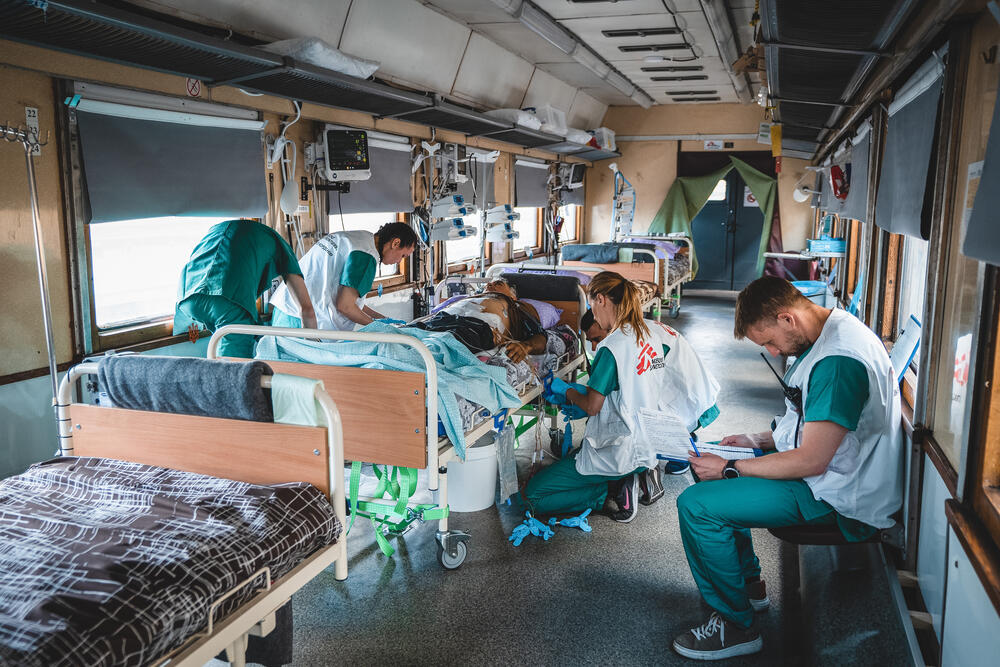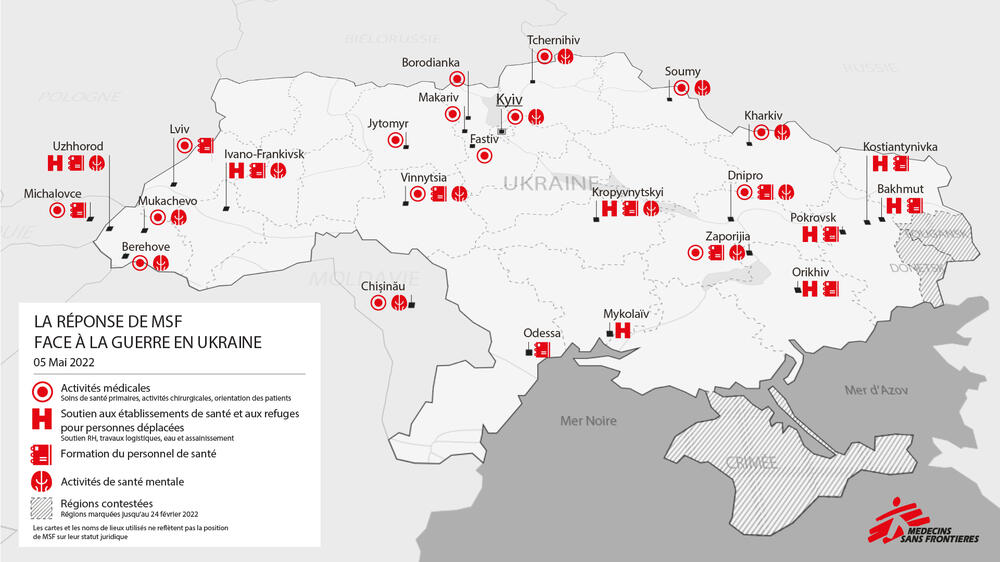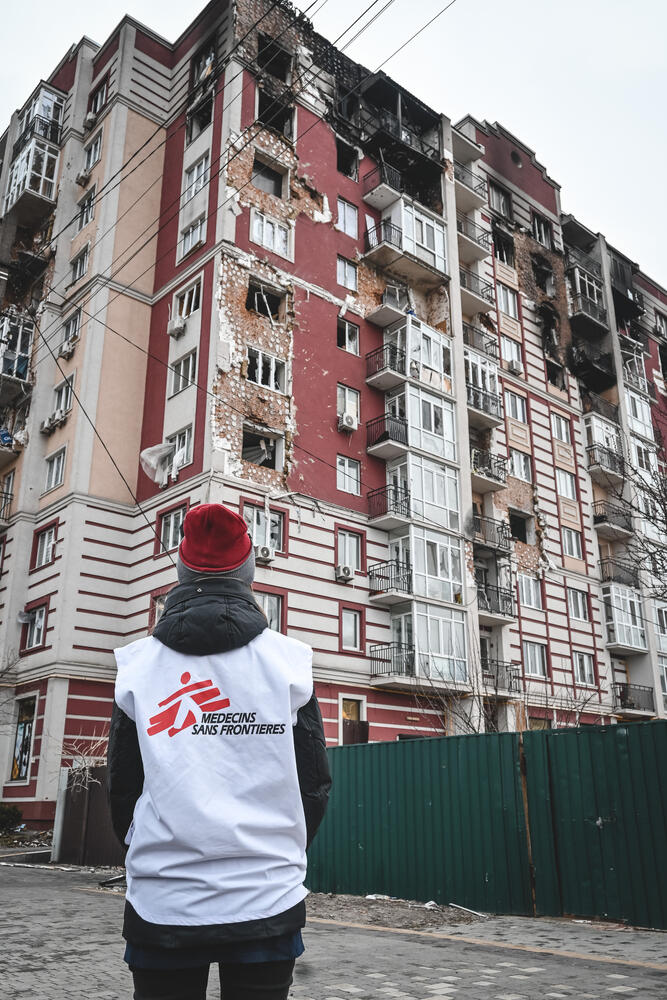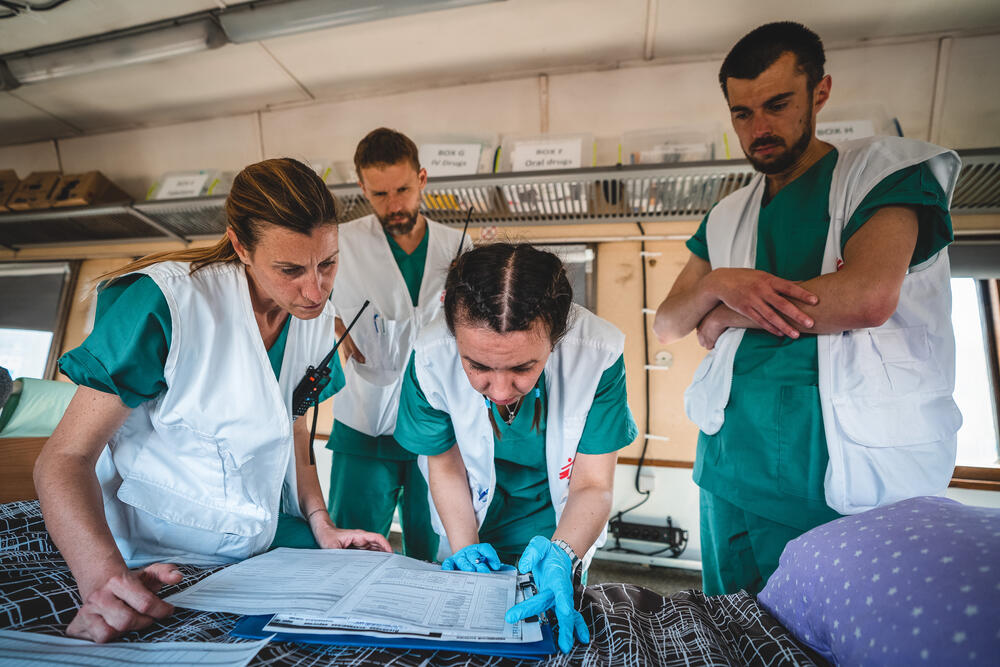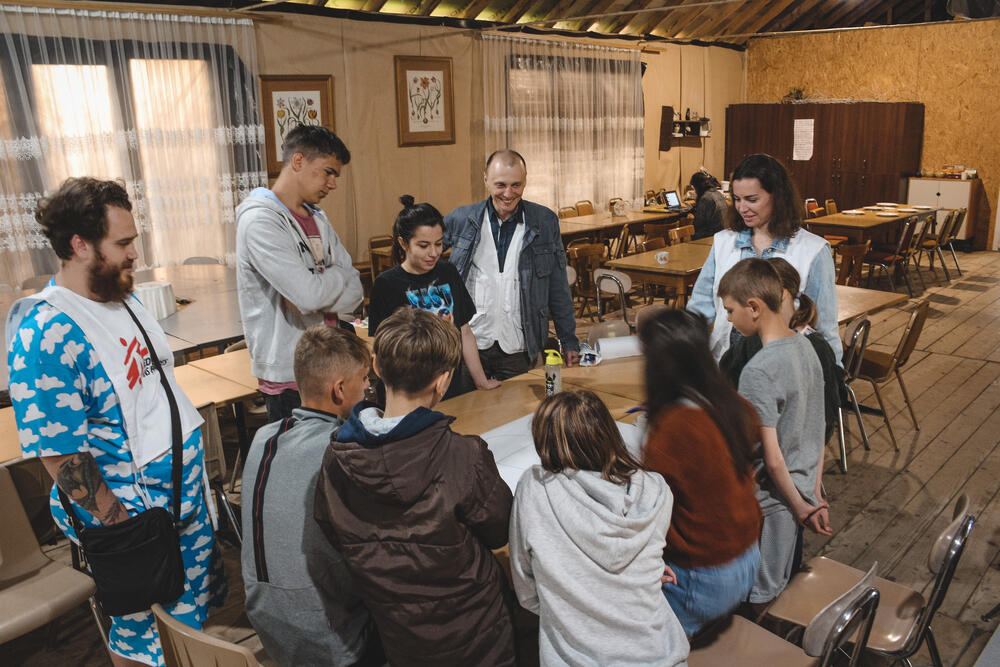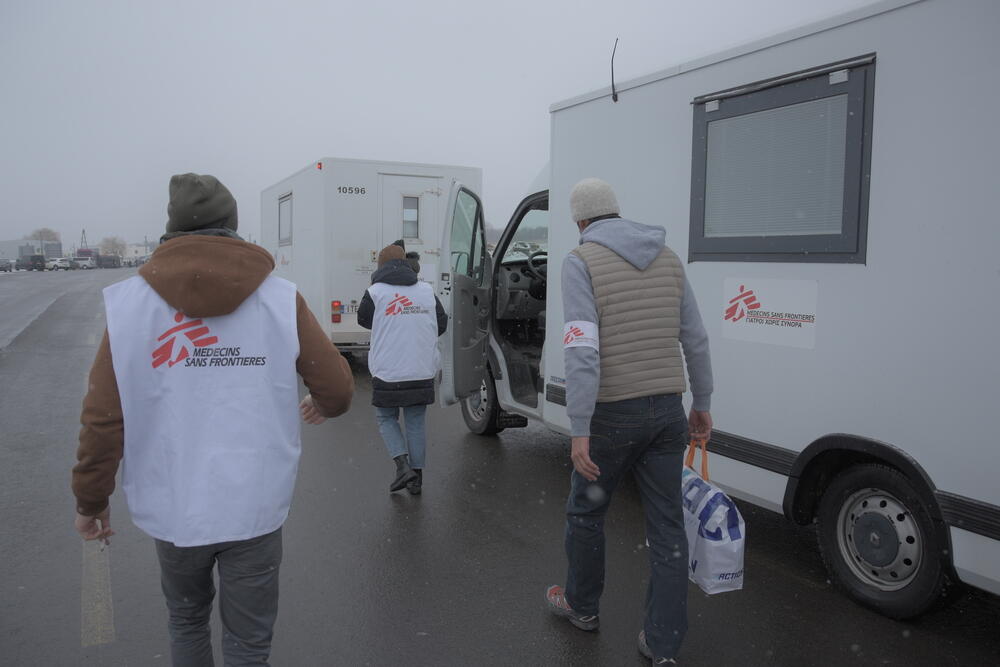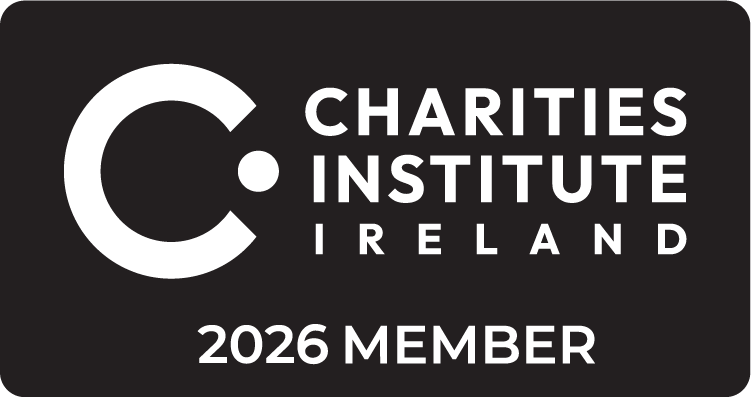MSF’s Emergency Response in Ukraine
7 March 2022
Fighting in Ukraine has killed or injured thousands of people, while more than 5.6 million refugees have fled to neighbouring countries.
Médecins Sans Frontières/Doctors Without Borders (MSF) teams are working to deliver emergency medical assistance to people still in Ukraine, as well as those now seeking safety in neighbouring countries.
The situation is extremely volatile and we have witnessed the devastating impact of the conflict on civilians – some cities are surrounded by military forces, under heavy bombardment and running out of food and water.
Many hospitals are facing dramatic shortages of medical supplies – from surgical tools to drugs for chronic diseases – while the mental health consequences of shock and suffering have been enormous, even in areas spared the brunt of the violence. And, every day, more people face a terrible choice: stay in an unsafe place or flee home into uncertainty.
The information about our response, below, is correct as of July 26, 2022.
How is MSF supporting people's medical needs
MSF medical teams are experts at working in conflict zones and complex humanitarian crises, while our experienced logistics staff and robust supply chains ensure critical supplies reach where they are needed.
- Primary healthcare, including treatment for chronic illnesses, for people in vulnerable situations who've fled their homes and stayed behind in areas with heavy fighting
- Support to Ukrainian medics with supplies and training
- Medical evacuations for patients from overwhelmed hospitals to safer areas
- Support to Ukrainian psychologists and first responders to provide mental healthcare for people who’ve faced intensely traumatic experiences
We are working to rapidly scale up our medical and humanitarian response where the needs are greatest and where we can have a life-saving impact.
Can I donate to support MSF’s work in Ukraine?
Thanks to the generosity of people like you donating to our general funds, we can go where and when we are needed most.
Please consider giving an unrestricted donation, which gives our medical teams across the world the valuable flexibility to respond whenever and wherever the needs are greatest in more than 70 countries, including Ukraine. When emergencies arise, we are able to act immediately.
Visit the following page to learn more: HOW WE SPEND YOUR MONEY
Please visit the following link, should you wish to donate to our general funds:
Our response to Ukraine: In-depth
Our priority in Ukraine is getting Ukrainian medics the medical supplies they need.
We're providing technical support and training on how to manage large numbers of wounded people, and relieving pressure by medically evacuating patients to hospitals in safer parts of the country.
While the focus so far has been on surgery, trauma and intensive care needs driven by the conflict, a worrying situation is also emerging for patients with chronic diseases such as hypertension, diabetes, asthma and heart disease who require key drugs and support.
However, with full-scale warfare in many areas, movements are difficult, dangerous or simply impossible. Communication networks are not always available and there is a significant amount of misinformation.
We’re helping ensure people in vulnerable situations with chronic illnesses continue to get the care and medications they need so their conditions don’t get worse.
We're also seeing that people are absolutely shattered by what they’ve been through. Anxiety, panic attacks and trouble sleeping are common symptoms.
We have increased our focus on mental health activities, including strengthening the capacity of Ukrainian psychologists and training first responders to administer psychological first aid.
Medical evacuation trains
On April 1, MSF began running a two-carriage medical train to evacuate patients in serious but stable conditions to safety. We are now also running a more highly medicalized train, capable of providing intensive care.
The trains take patients from overburdened Ukrainian hospitals close to active warzones to Ukrainian hospitals with more capacity that are further from active warzones.
To date, 1,053 patients have been evacuated, including 78 orphans evacuated from an orphanage. There have been 37 referral journeys from 31 March to 18 July.
Central Ukraine
Kyiv
- MSF’s team in Hostomel, on the outskirts of Kyiv, continues to support basic healthcare in alongside Ukrainian doctors and nurses. We have also intensified our mental health support and are looking to further scale up this aspect of our work in the area.
- In the city of Kyiv, we decided to end our activities by the end of July. Humanitarian situation and acute needs related to the conflict have recovered significantly, although gaps and barriers for the communities to access health care that they need remain due to economic or systemic (pre-conflict) issues. Mental health care is one of the most critical gaps for which the team is advancing efforts to advocate to other humanitarian actors to establish longer term programs. This also applies to our activities in Chernihiv.
- As part of our collaboration with Ministry of Reintegration and Temporarily Occupied Territories, we are providing mental health training to the call centre personnel. The call centre is run by the Ministry in order to respond to the needs of IDPs and the populations remained in the non-government-controlled areas (NGCA) in Ukraine.
Kropyvnytski
An MSF team is doing medical donations, trainings for health workers and first line responders, distributing relief items in IDP shelters and carrying out psychoeducation sessions with groups of displaced people and individual mental health consultations both in the town and peripheral areas. We are also supporting a maternity hospital to make more accessible services for survivors of sexual and gender-based violence (SGBV) and helping with the payment of medication and transportation for the patients.
Vinnytsia [central-west]
- In Vinnytsia, we provide support to people who have fled from other parts of the country and taken refuge in temporary and longer-term accommodation and shelters.
- In the shelters our teams run mobile clinics, providing medical consultations; continuation of care and medications for people with chronic illnesses such as hypertension, asthma, diabetes, heart disease, epilepsy; referrals to hospital for severely unwell patients; psychological first aid and mental health consultations; and basic relief items.
- Our teams provide kits with essential household and relief items, including items such as toilet paper, toothbrushes, toothpaste, soap, shampoo, nappies and towels.
- In Vinnytsia, we are facilitating the referral of elderly and vulnerable people who are evacuated from the eastern frontline regions and require medical follow-up for chronic disease. The ‘medicalised train’ and local ambulances are used for transportation, and our teams in Vinnytsia coordinate with local health authorities on the arrival of patients and hand them over to them.
Apostolove
In Apostolove, an MSF team has been working with the hospital to develop their emergency room and mass casualty response capacity.
Kryvi Rih
In the broader Kryvyi Rih area, MSF has started running mobile clinics providing basic healthcare, including sexual and reproductive health.
Mykolaiv and Odesa
- To help Ukrainian health facilities cope with a potential influx of injured people, MSF teams have trained hundreds of medical doctors and nurses to triage patients according to the severity of their injuries.
- In Bashtanka, just north of Mykolaiv, we made a large medical donation (primarily meds and emergency supplies) to the local hospital, following an airstrike and mass casualty event on 6 June.
- In Mykolaiv, MSF continues to fund the work of local volunteers who bring medical and logistic equipment in and out of the besieged city.
Northern Ukraine
Kharkiv [north-east]
- Following the developments of the security context and subsequent resumption of the functioning of the underground system, MSF ‘underground’ activities have been moved above ground and restructured to assist people who have no home to go back to and/or still need medical support. . Inside Kharkiv, we are currently supporting the city’s displaced people at various locations via mobile clinics. While some of the clinic activities are carried out in the locations of volunteer networks, some others are conducted in dormitories assigned for IDPs. However, the strikes in the city (and in the surrounding areas) have intensified again in the last weeks, which causes interruption of activities.
- Kharkiv city continues to receive shelling on a daily basis and precise location information for the shelling is not always shared, which makes planning and executing mobile clinics challenging. Meanwhile, many areas in the north remained out of reach due to security reasons this week. However, OCA teams were able to visit 10 locations with mobile clinics inside and outside the city between 9-15 June.
- Outside the city: We have started regular visits to two shelters in Donets and two other shelters in Slobozhanske, providing medical consultations and mental health support. We are also continuing movements to remote villages in Kharkiv oblast, focusing initially on the Derhachi, Chuhuiv and Ruska Lozova axes, to conduct explos and mobile clinics, to build connections and provide donations.
- In & Out: we operate a hotline for the city and the oblast to respond to ongoing needs for medications and online medical and psychological consultations. We have agreed to collaborate with a volunteer network for pick-up from our warehouse and distribution to people’s homes. The hotline is based on learnings from our NCDs hotline in Kyiv and it got a good response in its first week.
Chernihiv
In Chernihiv, we decided to end our activities by the end of July. Humanitarian situation and acute needs related to the conflict have recovered significantly, although gaps and barriers for the communities to access health care that they need remain due to economic or systemic (pre-conflict) issues. Mental health care is one of the most critical gaps, for which the team is advocating to other humanitarian actors to establish longer term programs.
Zhytomyr [north-west]
In Zhytomyr, MSF teams continue to provide social support (food parcels and hygiene kits) and psychological support to all active TB patients to help them to keep taking their medication correctly and complete treatment.
MSF also transports samples to the TB hospital for testing so that patients’ progress can be monitored.
At the same time, we continue to support the regional TB Hospital by providing them with TB and other drugs as well as laboratory consumables and food for patients.
Eastern Ukraine
Dnipro
In and around Dnipro, we are supporting vulnerable people who have fled parts of Donetsk and Luhansk oblasts where the conflict is particularly intense, and who are now staying temporarily or longer term in more than 40 shelters.
- Many of the people living in the shelters are highly vulnerable, including the elderly, people with disabilities, unaccompanied children and people who cannot afford to make the journey further west in Ukraine or abroad.
- In the shelters our teams run mobile clinics, providing medical consultations; continuation of care and medications for people with chronic illnesses such as hypertension, asthma, diabetes, heart disease, epilepsy; referrals to hospital for severely unwell patients; psychological first aid and mental health consultations; and basic relief items.
Zaporizhzhia
- In Zaporizhzhia, we are providing support to people who are arriving from Mariupol and other areas where fighting is intense.
- Our teams run mobile clinics in the main reception centre and more than 30 shelters throughout Zaporizhzhia, providing medical consultations; continuation of care and medications for people with chronic illnesses such as hypertension, asthma, diabetes, heart disease, epilepsy; referrals to hospital for severely unwell patients; psychological first aid and mental health consultations; and basic relief items.
- We have also donated medical supplies and carried out mass casualty training for staff at the main referral hospital in Zaporizhzhia.
Donetsk oblast (region)
- We are working with hospitals and primary health care centres close to the frontline in Donetsk oblast to make sure they have enough of the right supplies and training to be able to keep treating patients even if they get cut off from supply lines by intense fighting. This includes support to primary healthcare, treatment for chronic diseases, maternal healthcare and trauma.
- We are also equipping some hospitals with ‘autonomy kits’ infrastructural support, such as solar panels, generators, and water reserves to allow them to continue to operate if their power or water is disrupted, with infrastructure that can allow them to keep working for up to a week.
- MSF teams are supporting specific hospitals to reorganise and reinforce their emergency room capacity and to prepare for a possible mass influx of wounded patients as well as donating specific medicines and supplies in response to requests from facilities and medical staff.
- MSF also runs an ambulance referral service. Run out of Dnipro and Pokrovsk towns, this hospital-to-hospital referral service has seen been very active as fighting in the region has intensified in the last few weeks and continues to transfer patients from hospitals near the frontlines to health facilities further away in places like Dnipro. These ambulances also bring patients from hospitals to the medical referral train.
- Working through a network of passionate volunteers we are supporting groups of vulnerable people who have stayed, or been left, behind – the majority are elderly. People who remain in their homes or in local community spaces are living underground in often dire conditions – in many cases they have no light, fresh water, food or toilets or healthcare. We are focused on helping to fill the gaps in what people need, providing treatments for chronic diseases, donating essential items such as water as well as power banks to charge phones and lights. As frontlines get closer, and insecurity increases, in addition to increasing needs in terms of basic health and communications needs, it also becomes harder for these groups to move to seek safety. We are supporting with the evacuation of vulnerable people, if it is what they want including ensuring access to medical evacuation to facilities.
Western Ukraine
Uzhhorod and Ivano-Frankivsk [south-west]
- We have carried out trainings with local health professionals, including on mental health for psychologists and first responders, and have started group therapy sessions and individual mental health consultations with internally displaced people.
- In Ivano-Frankivsk we are supporting a clinic focusing on IDP patients run by doctors who are displaced from the conflict themselves and in Uzhhorod we started running a mobile clinic last week focusing on IDPs who are staying in public shelters.
- We keep doing donations to health facilities in these two locations and distributing non-food item (NFI) kits for displaced people, particularly in nearby rural areas.
Zhuravychi [north-west]
In mid-June MSF team obtained official permission to access a detention centre that accommodates migrants and asylum seekers (around 65 persons as of early July) in Ukraine. The majority of the people have been detained between two-three weeks up to eight-nine months. We have visited the facility three times and provided aqua tabs, medicine and non-food items (mainly hygiene kits and cleaning materials). MSF did not observe significant needs that would justify a continuous presence in the detention centre. However, the team did witness signs of increased mental health distress, related to previous traumatic events, lack of freedom of movement during ongoing conflict and limited access to translators. Therefore, the team will strengthen efforts to build advocacy towards Ukrainian Government, IOM/UNHCR and the European Union to explore alternative solutions, including the release of the people and relocation to a safe country.
Our emergency response in neighbouring countries
Belarus
Context: According to the Belarus State Border Committee more than 32,000 Ukrainians have arrived since February 24, including some 16,000 via the Ukrainian-Belarusian border, 13,500 via Poland and some arrivals via Lithuania (1,800) and Latvia (300). UNHCR has recorded more than 16,600 people crossing from Ukraine into Belarus as of 28 June (UNHCR).
- In Belarus, an MSF assessment team has moved to areas of the Belarus-Ukraine border to assess potential medical and humanitarian needs. In Belarus, our team has seen an increasing number of people forcibly displaced from Ukraine in need of medical assistance and social support. We are responding to the needs of patients from Ukraine, as well as other countries of origin, in Minsk, Brest, Gomel and Vitebsk regions. Among our patients there are many children and people with non-communicable diseases. A majority of them is in need of urgent psychological support. In Belarus, MSF continues to run its regular programmes. We support the national tuberculosis (TB) programme in the civil sector and in prisons.
- Since 2021, we have also been assisting people on the move stranded between Belarus and the EU countries.
Poland
Context: More than 4.3 million people have crossed from Ukraine into Poland as of 28 June 2022 (UNHCR).
MSF is actively working to support the Ministry of Health to provide treatment for patients with drug-resistant tuberculosis, including patients previously treated by MSF in Ukraine.
Russia
Context: Over 1,410,000 people have crossed to Russia from Ukraine as of 28 June 2022 (UNHCR).
- MSF has been present in Russia for 30 years. Currently, MSF’s teams in Russia work with health authorities in Arkhangelsk and Vladimir regions to support crucial, life-saving treatment for patients with drug-resistant tuberculosis. In the last few months, MSF scaled up its assistance to partner organisations in St Petersburg and Moscow ensuring continuation of HIV treatment for people from Ukraine and other people in need. We’ve seen an increase in the number of people from Ukraine living with HIV and hepatitis C in need of refills for their antiretroviral medicines.
- Alongside this, MSF has recently started to support people displaced to Rostov and Voronezh (since February 2022), in coordination with local authorities. In May 2022, a dedicated MSF hotline was launched with an aim to provide referral services to medico-social support to the refugees and displaced people from Ukraine. As of late June, MSF with the support of local specialists responded to the needs of more than 100 people. MSF in collaboration with local NGOs delivered essential relief items including food, glucometers and consumables to diabetic patients from Ukraine in Voronezh. We are continuing the support with food and hygiene items. MSF through local organisations, social workers and local health providers, aims to link populations in need to existing medical and humanitarian services and improve their ability to receive the needed medical and humanitarian support. As in any country, our work in Russia is focused on providing medical care where we can, based on medical need alone.
Slovakia
Context: More than 540,000 people have crossed to Slovakia from Ukraine and more than 270,000 have crossed from Slovakia into Ukraine, as of 28 June 2022 (UNHCR).
- We have signed a Memorandum of Understanding with the Ministry of Health to be able to import medical supplies and we have trained health staff on TB and MDR-TB, and SGBV.
- For the moment, the critical humanitarian and medical needs are covered by the local authorities and civil society.
